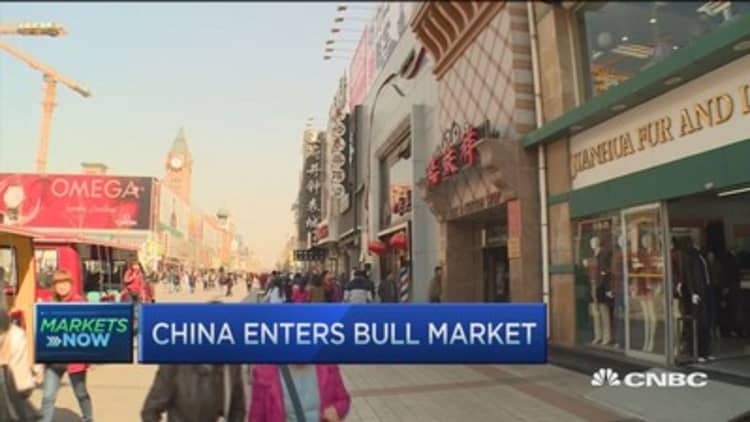Even after Yiqun Bo and Jerome Scola closed the first round of funding for their new venture at $2 million dollars, Chinese angel investors kept approaching them.
"We just had to tell them, we're sorry, the fund is closed," remembers Scola, co-founder of Day Day Up, a global network of workspaces for tech startups.
Last month, the company opened its first office space - an airy penthouse with filtered air, a sleek design and a view over the trendy Beijing neighborhood of Sanlitun, where the likes of Airbnb, Flipboard, Uber and Linkedin have also set up shop.
Day Day Up is not alone in attracting more interest than the founders can handle.
In the past, Chinese startups struggled to find early investors who had the networks and expertise to help entrepreneurs develop products and nurture good ideas before they hit one of the most competitive tech markets on earth.
Recently, though, a slowing economy, the success of a few homegrown angel investors and limited investment options have combined to set the ranks of China's nouveaux riche – especially those that made their their money in the IT sector - on the hunt for the next unicorn. It's a development that could for the first time give Chinese start-ups room to more easily polish their ideas and craft business plans that can cross borders.

Day Day Up's investors are eager not only for the success of this venture but also for the opportunity to come face to face with its tenants. In a reflection of their own global designs the angel investors have encouraged Liqun and Scola to expand far beyond leafy Sanlitun, to Shenzhen, Bangalore, Jerusalem and, of course, Silicon Valley itself.
It hasn't always been this way. Fifteen years ago the likes of Alibaba's Jack Ma and Tencent's Pony Ma were forced to look overseas to fund their companies because there were no Chinese early-stage funders willing to bet on Internet startups in their own country. To this day, South African media firm Nasper holds a 46 percent stake in Tencent thanks to the early reticence of Chinese investors.
Just over seven years ago, when entrepreneur David Chen and fellow Harvard MBA and media executive Ted Lai decided to try their hands at early stage investing in Shanghai, they couldn't find a club to join. They wound up forming their own, Angelvest.
"We went from no angel investors' clubs when we started Anglevest to literally thousands of local investors," said Chen. Angelvest, which draws mainly foreign investors, now has groups in Beijing, Singapore and Hong Kong in addition to the original Shanghai club, which meets in the upstairs bar of a Shanghai restaurant once a month to hear pitches from eager startups.
In October, Long Neck Investments, an angel investment group founded by billionaire tech entrepreneur and grassroots investor Cai Wensheng, announced plans for an IPO on the Shenzhen Stock Exchange, which would make it China's first publicly-traded angel investment company.
China's population of high net worth individuals – those with individual investable assets of more than $1.6 million – has more than doubled since 2010, according to recent survey by Bain and China Merchants Bank. At the same time, the meteoric rise of Chinese tech titans, plus Prime Minister Li Keqiang's call for "mass entrepreneurship," backing his words with $6.5 billion dollars in grants, tax breaks, and subsidized technology parks, has caused a startup boom.
State-backed venture capital funds, as well as funds developed by dominant players such as Alibaba, have offered seed funding tailored to the smaller capacity of fledgling companies. But neither group was really interested in developing startups - while the former are beholden to the bottom line, the latter have incentive to vacuum up competition, not make it better. This is where China's new wave of angel investors has come in.
"The motivations of angel investors can be different – they may be financial, they may be personal and they may be psychic," says Andy Mok, founder of Red Pagoda Capital and Beijing Tech Hive. "Often an investor can offer an enterprise a critical missing piece."
Timing is also playing a role in encouraging interest in start-ups.
For years, there was little incentive to bother with risky investments in unknown ventures. As China's economy boomed, local investors reaped the same high returns on investments in solid, mature companies that had been successful in finding early-stage investment overseas.
"In Silicon Valley a person looking for venture capital type returns of 30 to 40 percent needs to be investing very early," said Ramakrishna Velamuri, a professor who studies entrepreneurs at CEIBS. "In China, because the market has been growing so fast, even investing at such a late stage they could expect the same returns."
Velamuri cautions that even tech startups are not immune to economic headwinds and that successful early-stage investing is still hard. Investors accustomed to working with years of financial data are forced to make bets on the basis of qualitative judgments about character and skill and unexploited niches of a shifting market.
But, unlike stock markets, where individual Chinese investors have learned the hard way that both bulls and bears are beyond their control, angel investors can better their chances with sweat, connections and know-how.
"Our time is what we hope mitigates the risk and that's what actually happens with a lot of these companies, because they need the help," said Chen of Angelvest.
As the pool of money ready to be invested in start-ups grows, so too do the ranks of entrepreneurs with ideas of varying degrees of quality and originality.
Chen has invested in everything from agribusiness startups to a facial robotics enterprise. Unicorns can come in strange guises, such as the selfie photo-shopping application Meitu, which converts subjects into big-eyed, pointy-chinned, cat-like versions of themselves. Meitu transformed Long Neck's Cai Wensheng from a famous entrepreneur into an even more famous, and perhaps China's most widely known, angel investor.
"In China everyone now will tell you they are an entrepreneur," said Mok. "The trick is being able to find the signal in all that noise."






